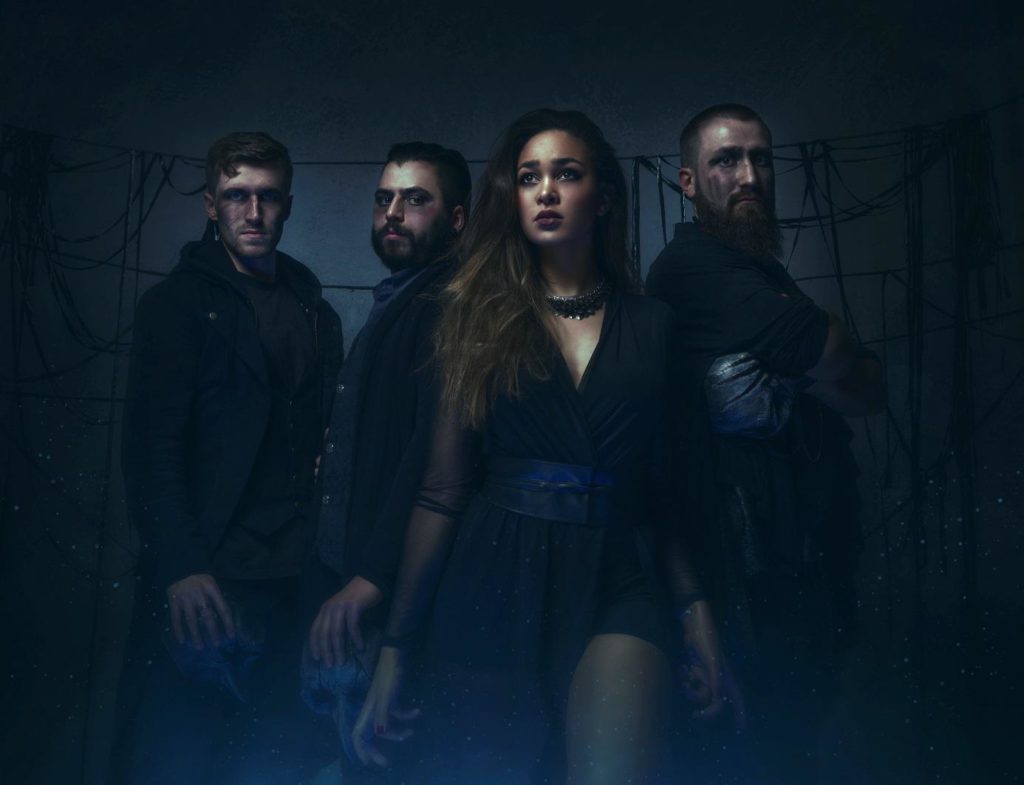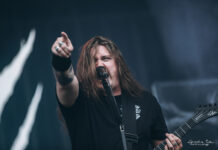Since the new AD INFINITUM release, “Chapter II – Legacy,” deals with a rather intriguing historical figure – Vlad the Impaler – we made contact with the band to learn more about the subject matter, but also details about the collaborations, and production of the album. Guitarist Adrian Thessenvitz provided us with answers to all our questions. Read the interview below:

Hello! How are you doing and how have you been doing these past few months?
Hello, this is Adrian, the guitarist from AD INFINITUM! We are doing very well! Producing this album and the videos plus receiving the first feedback feels very rewarding! And we’re all super excited for the release.
Before talking about the album, I would like to know what is the inception story of AD INFINITUM? How did you meet and what made you decide to form a band together?
Melissa started AD INFINITUM as a solo project. Soon she realized that she wanted to do more with it and asked Niklas Müller as a drummer. They met very often on tours with SERENITY. Niklas and I met for the first time when we were children. We played together in a program for young jazz musicians in Bavaria. My family moved when I was a fifteen-year-old and we lost contact. But you know how it is with social media. He saw that I started playing metal too and then he asked me to join AD INFINITUM. Jonas Asplind left the band and I asked Korbinian to jump in. He and I are very active in the music scene in Cologne and he played often in my own metal project. That’s how we got to know each other.
When did you first pick up your instrument and when did you actually start playing?
We all started at a very young age. I started to play classical guitar at the age of six. My father played his bass daily and he did his exercises before dinner. So hopping on that train was my motivation to ask for an instrument for Christmas.
Obviously, we’re here to talk about “Chapter II – Legacy.” How are you feeling about the album as the release day approaches?
We worked so hard on the songs, the details, the promotion campaign, the videos, and many surprises that will be announced soon, so we are more than excited to drop this album!
I don’t think you’re the kind of band that writes music by jamming, so how do you usually write songs? Did your process change during the lockdown?
Yes, the process changed, since we wrote the songs together this time. But it went super smooth! We met for songwriting sessions via Skype and collected our ideas in Dropbox. Many ideas for the orchestrations are coming from us too since we all upgraded our home studios during the lockdown.
As a fan of both DYNAZTY and AMARANTHE, I am really curious how your collaboration with Nils Molin came about. Did you want to work with him specifically, or did you think his voice suited the song best? And what did he bring to “Afterlife”?
We wanted him right from the start. And it was an amazing experience having him on board. His and Mel’s voice just worked so well together and Nils had pretty good ideas on how to add a new color to the song.
“Chapter II – Legacy” is also another album you decided to produce yourself. What are the advantages of this avenue of doing music? Do you feel you have more creative freedom when you produce an album yourselves?
We all enjoyed producing it ourselves. At first, it was kind of scary because we didn’t have a third eye on the songs and we were super careful with our song structures and ideas. But in the end, the creative freedom was the best thing ever. We had so much fun combining different elements from different genres and seeing that it works so well!
Why did you decide to work with Jacob Hansen at the mixing stage of the album? Did he understand your point of view and what you wanted?
We worked with him on our first album already. We loved the sound of “Chapter I – Monarchy” so we definitely wanted to have him on board for “Chapter II – Legacy.” We met at a mixing session at his studio and it was a great time with him. He really knows the genre!
The orchestrations are done by Elias Holmlid. How was it to work with him and what did he bring to the album?
His input was very important. On some songs, we had very concrete ideas regarding the orchestrations, but we’re not as experienced as him. Working with him was super easy, he directly understood what we wanted and his ideas exceeded our expectations many times. For example, the outro of “Animals” or the intro of “Inferno.” Pure ear candy.
Coincidentally, I am Romanian, so the story (and the myth) of Vlad the Impaler is a familiar one. What made you choose him as a source of inspiration for this album?
For some, he was a hero, for some a monster. And of course, the myth about Dracula was the perfect inspiration for an album.
How much did you already know about Vlad the Impaler before writing this album or did you have to do some research?
Melissa did write the lyrics and she did a lot of research. I don’t know how much she knew before, but now she can tell a lot of stories about him.

Reading through the lyrics, I feel you guys have taken the same approach as LORD OF THE LOST did for “Judas” in the sense that, as the album progresses, we see a sort of transformation from ruthless ruler and damned soul (“Inferno”) to, maybe not glorified hero, but someone who did what was necessary to defend his country (“Lullaby”). Could you give us some insight into how you set up the story and wrote the lyrics?
There’s no historical order among the songs. The songs light up different facets of Vlad’s life. So there is a song about his story with his brother, another one is fictional, others are about defending his home and others are about primal instincts on a battlefield and so on. We want people to understand what the songs are about, but leaving enough room for interpretation, so many listeners can find themselves within the songs.
There are also elements of the supernatural present in the story, such as demons, angels, the afterlife, and immortality. Are all these metaphors for how future generations will perceive us and our actions or did you actually write a horror-fantasy concept album based on the myth of a person whose lust for blood turned him into an immortal being (vampire)?
Of course, we have the concept of writing lyrics inspired by historical characters. But in the end, all the images and metaphors are here to leave some space for your own interpretation. If the lyrics are too concrete, they tend to be too simple-minded.
So far you’ve released two videos – “Unstoppable” and “Afterlife.” How did the shoot for these videos go and are there any stories you can share with us about the making of these videos?
We had a great team for these videos. We teamed up with Ralf Leitner again, who did “Marching On Versailles” and “See You in Hell.” Both videos were shot outside and you know this summer in the middle of Europe was pretty lame, so we were lucky with the weather. We almost needed to stop the shooting of “Unstoppable” because it started to rain in the middle of our preparations.
Also, I am curious where you shot “Afterlife,” because I really like that castle and the medieval feel of that video. So what can you tell us about the location?
Ralf found this location, it’s the “Magic Castle” in Seefeld, Austria. What a beautiful place. In the video, you can see only half of the majestic view because we shot at night. Definitely worth visiting this place!
Will there be a release live stream for the album? If so, what details can you give us?
I don’t know when this interview will come out, but yes, we have a solution for fans all around the globe!
[edit: in the meantime, the band has already announced the online concert “Live in Turbinenhaus” for November 6th. More info and tickets here: momenthouse.com/adinfinitum]
I feel like everybody is saying these days to check out their music on Spotify, and it’s understandable, it’s a big platform. But are there other platforms where people can listen to your music, or does Spotify have a sort of monopoly on streaming?
I think bands generally say ‘Spotify’ and mean all other streaming platforms at the same time. There are so many, you just can’t name them all. And of course, you can listen on any platform to our music. Spotify has a very strong standing and is (at least for us) our main benchmark to see how well we perform right now.
What about the physicality of music? Is an album only an album when it is in some form on the store shelf, or would it be enough for you to find the album on streaming services only?
I need both. The physical version of my album in my hands with the booklet and seeing it on all platforms. Only one of those things wouldn’t feel right.
Do you have any last thoughts you want to share with our fans and our readers?
Yes! Thank you so much for your support in the past months! It really helped us to keep going! We can’t wait for your reactions and feedback on our upcoming album! Take care and see you soon at our release concert in Pratteln on the 29th of October!





